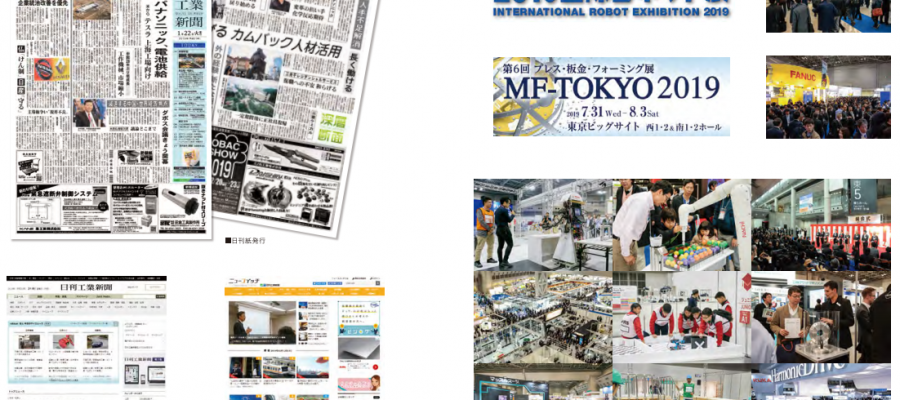
As a newspaper providing comprehensive coverage of industrial matters, the Nikkan Kogyo Shimbun, Ltd. has continually strived to contribute to the development of a more prosperous society.
The Nikkan Kogyo Shimbun, Ltd. is currently embarking on a new chapter. In November 2015 we joined the ranks of centenarian companies. Over the last 100 years we have stuck steadfastly to our principles of contributing to nation-building through industrial and technological progress, contributing to the development of Japanese science and technologies, working to strengthen competition in the industrial sector, and helping invigorate small- and medium-sized companies. While maintaining this proud tradition, we now aim to further enhance our function as an organization disseminating comprehensive industrial information, keeping the newspaper as our core medium, while applying fresh new perspectives in business areas such as digital media, exhibitions and events, publication, and education.
Management philosophyOpen/Close
- Get to the heart of the issue and disseminate information that provides guidance to the industrial sector.
- Focus on innovation in monodzukuri or manufacturing and contribute to the development of Japanese industry and technologies.
- Value our employees, work hard to nurture them, and establish our competitiveness as a company.
Company profileOpen/Close
| Company Name | THE NIKKAN KOGYO SHIMBUN,LTD. (THE DAILY INDUSTRIAL NEWS) |
|---|---|
| President | Haruhiro Imizu |
| Head Office | 〒103-8548 14-1, Nihombashi Koami-cho,Chuo-ku, Tokyo 103-8548, Japan Google Map |
| Main Phone Number | (+81) 3-5644-7000 |
| FAX | (+81) 3-5644-7100 |
| Capital | ¥100,000,000- |
| Number of Employees | 523 (as of March,2017) |
| Branches | Tokyo, Osaka, Nagoya, Seibu (Fukuoka), and 41 news offices |
HistoryOpen/Close
| 1915 | Established the company under the name TETSU SEKAI |
|---|---|
| 1921 | Changed name to Kogyo Shimbun |
| 1922 | Changed name to Nikkan Kogyo Shimbun |
| 1942 | Merged with Chugai Shogyo Nippou |
| 1945 | Revived as independent newspaper under the “Kogyo Shimbun” masthead |
| 1950 | Newspaper title changed to “Nikkan Kogyo Shimbun” |
| 1955 | Tokyo office becomes organizational hub and “Nihon Kogyo Kai” (Japan Industrial Association) established |
| 1966 | Printing commences in Osaka |
| 1972 | Printing commences in Fukuoka Published “Nippon Rettou Kaizou-ron (Building a New Japan)”, bestseller of the year, written by Kakuei Tanaka, former Prime Minister |
| 1983 | Use of N-CES, a new version of computerized typesetting, commences |
| 1985 | Corporate identity established, new corporate emblem introduced, and masthead logo changed as part of 70th anniversary project. “Nihon Kogyo Kai” (Japan Industrial Association), “Kogyojin Kurabu” (Industrialist Club), “Kansai Kogyojin Renmei” (Kansai Industrialist League), and “Nagoya Kogyojin Kurabu” (Nagoya Industrialist Club) organized into newly established national organization called “Nihon Kogyojin Kurabu Rengokai” (Japan Industrialist Club Federation) |
| 1989 | “Nihon Kogyojin Kurabu Rengokai” (Japan Industrialist Club Federation) renamed “Nihon Sangyojin Kurabu Rengokai” (the Association of Japan Industrialists Club) |
| 1990 | New buildings constructed for the Osaka branch office, Nagoya branch office, and the Seibu branch office |
| 1995 | Launched “Metro Guide”, Tokyo Subway System’s free newspaper |
| 1996 | Website established |
| 1997 | First Japanese mass media organization to receive a Stratospheric Ozone Protection Awards from the U.S. Environment Protection Agency |
| 2000 | Merged with Ryutsu Service Shimbun “News Wave 21,” the newspaper industry’s first email-based news service launched |
| 2001 | New generation of computer typesetting technology adopted |
| 2004 | Head office shifted to Nihombashi-Koami-cho, Chuo-ku, Tokyo |
| 2005 | Hold 90th anniversary commemorative event “Sangyojin Matsuri” |
| 2006 | 20,000th edition printed in December |
| 2007 | Conference for the Promotion of MONODZUKURI (now called MONODZUKURI Nippon Conference) launched |
| 2009 | Head office and Tokyo branch office acquire “ISO14001” accreditation |
| 2010 | Online edition for overseas markets launched |
| 2012 | Online edition for domestic market launched in April |
| 2015 | 100th anniversary |

